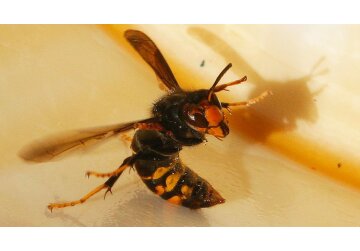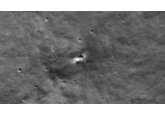
Record number of Asian hornet sightings in UK - as report highlights huge worldwide cost of invasive species
A UN report has warned that invasive species are costing the world economy at least $423bn (£336bn) a year - and the number of new alien species is increasing by 200 each year.
A record number of Asian hornet sightings have been reported in the UK so far this year, figures show.
There have been 22 confirmed sightings of the non-native species so far in 2023, according to the Department for Environment, Food and Rural Affairs (DEFRA).
That is more than the previous six years combined - and more than ten times the number sighted last year.
While Asian hornets are considered no greater risk to human health than other wasps or hornets, they are predators of native bees and wasps.
It comes as a landmark report by the United Nations (UN) warns that invasive species are costing the world economy at least $423bn (£336bn) a year.
The report also warns that invasive species are travelling around the world at "unprecedented rates" because of humans, and are threatening native plants and animals with extinction.
'The tip of the iceberg'
Published by the UN's Intergovernmental Platform on Biodiversity and Ecosystem Services (IPBES), the report has found that more than 37,000 "alien species" have been introduced by many human activities to regions and biomes around the world.
Of those, more than 3,500 are reported to have had negative impacts on their non-native environments - and are therefore classed as "invasive alien species".
The report, published on Monday, also warns that new alien species are being recorded at an unprecedented rate of approximately 200 each year.
Meanwhile, the global economic cost of invasive alien species has at least quadrupled every decade since 1970, according to the authors of the report, who have described the figure as "a huge underestimate" and "the tip of an iceberg".
One major concern highlighted in the report, compiled from research by 86 scientists from 49 countries, is the impact on native species.
It warns that invasive alien species have contributed solely or alongside other drivers to 60% of recorded global extinctions - and are the only driver in 16% of the documented global animal and plant extinctions.
Governments around the world have committed to protecting 30% of the Earth's land and seas for nature by 2030, and 143 of them have approved the new IPBES report as providing some of the scientific knowledge towards achieving this goal.
Professor Helen Roy, of the UK Centre for Ecology and Hydrology and one of the report's co-chairs, said invasive species can be mitigated "through effective management".
news.sky.com







